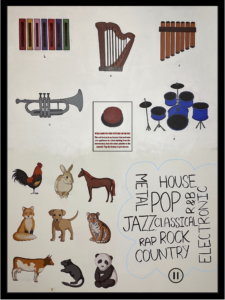
The Evolution of Human-Computer Interaction and its Technological Advancement with a Focus on Applications with Electric Paint

Name: Sobika Thapa
Major: Computer Science
Minor: Statistical & Data Sciences
Advisors: Heather Guarnera, Daniel Palmer
“Playing sounds by touching on the canvas”. This research investigates the potential of Electric Paint in creating interactive appliances and aims to provide a good user experience. Electric Paint is a type of paint that can conduct electricity and can be used to create circuit boards by painting the desired area on non-conductive surfaces. The study focuses on Human-Computer Interaction (HCI) principles and aims to apply them to the 2D appliances created using Electric Paint on a canvas. The design and implementation involve the conductive Electric Paint, a small computer Raspberry Pi, a capacitive sensor PiCap, wires, and conduct tapes. The PiCap acts as a bridge between Electric Paint (painted on the canvas surface) and Raspberry Pi by reading touch signals and sending them to the Raspberry Pi, which triggers output signals. The final design consists of a canvas with five 2D musical instruments, a music playlist, and ‘Animals for Kids.’ The design was modified based on the survey’s feedback to enhance usability.
The study concludes that Electric Paint has the potential to create unique and interactive appliances that allow for more intuitive and engaging user experiences. It eliminates the need for traditional switches or buttons, creating a more seamless and intuitive interaction. Electric Paint’s ability to be applied to various surfaces and its low power consumption make it a versatile material that can be used in creating touch-sensitive lamps, interactive wallpapers, smart home devices, and wearable technology. The study’s results demonstrate that by incorporating HCI principles into the design, Electric Paint can be used to create user-friendly interactive appliances in a non-conventional way.
Best Use of Technology to Promote Interdisciplinarity AwardSobika’s Final Canvas

Posted in Comments Enabled, Independent Study, Symposium 2023 on April 15, 2023.
Related Posts
Related Areas of Study
Statistical & Data Sciences
Use statistics, math, and computer science to gain insights into data and solve real-world problems.
Major MinorComputer Science
Solve complex problems with creative solutions using computer programming and applications
Major Minor

